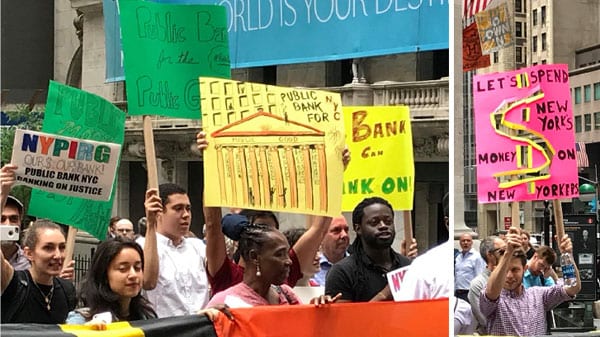
November 29, 2018; Gothamist and Last Real Indians
It’s time to walk the talk on climate change. That’s the message activists communicated this week when they rallied outside New York City Hall on the fourth UN-backed Annual Climate Finance Day to demand that New York divest from its designated banks, which invest heavily in the fossil fuel industry, and create a municipal public bank.
The movement for a public bank has been building in New York for some time, as it has across the country. Proponents see the public bank as a tool to move communities toward racial and economic justice. The organization Public Bank NYC declares, “Through a public bank, New York City can support vital sectors of our local economy and divest from banks that are financing destructive corporate interests, including speculative real estate, private prison and immigrant detention companies, the global arms trade and the fossil fuel industry.”
Public Bank NYC was joined at this rally by fellow community groups including NYPIRG, South Bronx Unite, the New Economy Project, New York Communities for Change, and Chhaya CDC.
Jake Offenhartz of Gothamist writes, “Just about every major bank in New York City is complicit in fossil fuel financing.” New York does its banking with institutions known as “designated” banks, which are deemed eligible to hold NYC public financing by the NYC Banking Commission, a three-member body comprised of Mayor de Blasio, City Comptroller Scott Stringer, and Finance Commissioner Jacques Jiha. It’s unusual for the city to revoke the designation or remove funds, but it does happen, as when Wells Fargo was caught up in an account fraud scandal.
Activists are motivated by both the increasing danger of climate change and the inequity perpetrated by the for-profit banking system. “In my South Bronx community, where asthma hospitalization rates are eight times the national average, we live and breathe a climate catastrophe,” said Mychal Johnson, co-founder of South Bronx Unite. “Our environmental and social justice advocacy is directly linked to community economic justice.”
Sign up for our free newsletters
Subscribe to NPQ's newsletters to have our top stories delivered directly to your inbox.
By signing up, you agree to our privacy policy and terms of use, and to receive messages from NPQ and our partners.
Even some officials agree; Public Bank NYC quoted Councilman Mark Levine saying, “Our City should put its own money to work for New Yorkers through a public bank, which would supercharge investments in critical projects…and return financial power to the people and businesses that need it most.” Unfortunately, the people that most need investment are also the most at risk when superstorms hit the city.
Mayor de Blasio has made some attempts to put New York on the map in the fight against fossil fuel companies, such as when ex-attorney general Eric Schneiderman sued ExxonMobil and other companies for damages related to climate change; the suit was dismissed, but other cities fight on.
However, as with many social justice movements, activists are tired of the “we’ll talk about it later” approach and demand more immediate action. Climate change is becoming a bigger problem faster than we can react to it. Economic inequality has reached historic levels. Awareness of the problem is not enough, nor are demands for accountability from fossil fuel companies.
Mayor de Blasio committed to divesting the city’s pension fund from fossil fuel companies, but hundreds of millions of dollars in city finances still sit with institutions that increased their investments in fossil fuels last year. According to Gothamist, “Citibank, which holds $425 million in city cash, increased their commitments as well, led by $522 million in financing for the Dakota Access Pipeline.” Rachel Rivera, member of New York Communities for Change, said, “New York City needs to do everything in its power to end climate change, and that includes creating a public bank so we can stop doing business with the banks funding the fossil fuel industry.”
New York officials are being presented with a solution that both empowers marginalized communities and sends a message to the fossil fuel industry. The reluctance to move on this idea lays bare city’s hesitancy to shift significant power, in the form of capital, from bankers to communities. What would it look like if that amount of money were reinvested in the communities that advocate for a more sustainable city?—Erin Rubin













